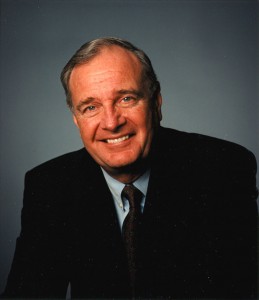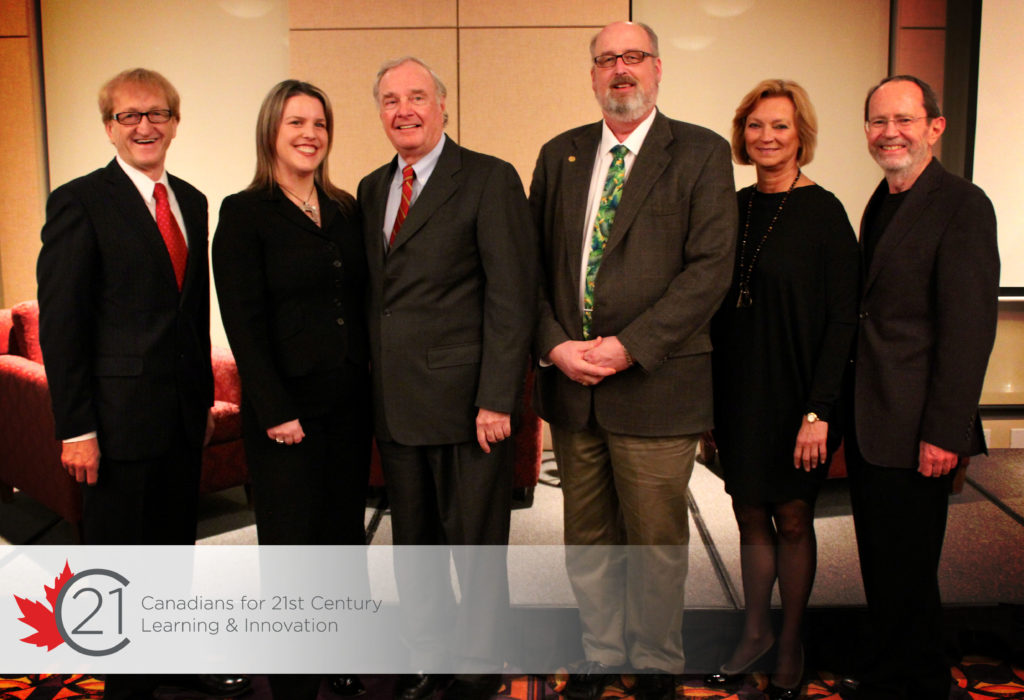Robert Martellacci, Vice President of C21 Canada, interviews Alexandra Dunn, a Speech and Language Pathologist from the Upper Canada District School Board about receiving the inaugural Shifting Minds Individual Award for 21st century Learning and Innovation.
Summit Highlights with TakingITGlobal’s Jennifer Corriero and Principal George Couros
TakingITGlobal’s co-founder Jennifer Corriero talks with George Couros, the Division Principal of Innovative Teaching and Learning for Parkland School Division, about their round-table discussion at C21 Canada’s Summit 13.
Innovative educators honoured at 2nd Annual C21 Canada Summit
Photo Caption: L-R, Doug Prescott, Alexandra Dunn, The Right Honourable Paul Martin, Bill Kierstead, Naomi Johnson and Ron Owston
KING CITY, ONTARIO, Wednesday, February 13, 2013 – C21 Canada – Canadians for 21st Century Learning & Innovation, a not-for-profit organization made up of education organizations and knowledge sector companies, launched its inaugural national awards for Leadership and Innovation on February 12.
C21 Canada’s Shifting Minds National Awards for leadership in 21st century Learning and Innovation are presented in the following three categories:
The System Award is presented to a school district, board or Ministry that supports 21st century models of leadership and invests in ICT rich learning environments where learning and innovation is evident.
The School Award is presented to a school demonstrating culture and sustainable leadership in 21st century learning and innovation.
The Individual Awards are presented to a student or educator in the public education system, a private sector individual, or one who has provided support from outside the public education system.
The Shifting Minds School System Award was presented to Naomi Johnson, Chief Superintendent of Education on behalf of the Calgary Board of Education. Naomi champions the humanity of personalized learning where students are co-creators of knowledge, engaged to understand themselves as learners with a horizon beyond high school. The CBE has created an ICT environment that connects students to the future. At the CBE, technology and lifelong learning are woven together for the benefit of more than 107,000 students, reflecting Naomi’s vision for education.
The Shifting Minds School Award was presented to Doug Prescott, Head of School at the Canadian International School in Beijing. Founded in the fall of 2005, the Canadian International School of Beijing offers a world-class facility with an internationally recognized Canadian education curriculum and the International Baccalaureate Programme. CISB enrols students representing over 50 countries and offers programming in Montessori Nursery from 18 months to 3 years of age, and Pre-Kindergarten to Grade 12. As one of the leading educational institutions in Beijing, CISB’s main focus is to serve and provide children with the highest 21st century education standard possible. CISB teachers are well versed in 21st century teaching and learning methodologies offering a diverse blend of experiences and energies with the majority being recruited from Canada and a cultural balance of teachers from Asia.
“I was honoured to accept the inaugural C21 Canada Shifting Minds School Award on behalf of the staff and students of the Canadian International School of Beijing and our visionary school owner, Dr. Francis Pang. Being recognized by C21 Canada is a confirmation that our 21st century student focused leadership initiatives are on target and valued,” states Mr. Prescott.
The Shifting Minds Individual Awards were awarded to Bill Kierstead, Alexandra Dunn and Dr. Ron Owston.
Bill Kierstead is a 26-year career educator who has worked throughout the New Brunswick Public Education system as a teacher, administrator, board supervisor, curriculum specialist and the Director of New Brunswick’s NB3-21C initiative. Bill has pioneered school-based video conferencing, signed the first Memorandum of understanding between a school and the Canadian Space Agency, and continues to share his wealth of knowledge and expertise with his professional learning network.
“I am honoured and humbled to be named alongside the other honourees as a recipient of C21 Canada’s Shifting Minds Award. To have my career’s work in the service of public education recognized by my peers is a thrill for me professionally and personally,” says Mr. Kierstead.
Alex Dunn is a Speech and Language Pathologist from the Upper Canada District School Board working extensively to increase achievement for all students, including those with significant disabilities, by incorporating emerging technologies in inclusive learning environments through the use of a Universal Design for Learning Toolkit. Sharing her own SMART inclusion research through publications and conferences around the world, her work in inclusive environments has sparked similar research projects and initiatives across Canada, and to a worldwide audience.
“This award, which acknowledges the leadership of the Smart Inclusion team comprised educators, students and parents at Upper Canada District School Board, will create more opportunities to share and learn with others across Canada and internationally and thus the potential for learning for ALL is unlimited,” says Ms. Dunn.
Dr. Ron Owston is Dean of the Faculty of Education and former Director of the Institute for Research in Learning Technologies (IRLT) at York University. He has spoken at numerous national and international conferences, and is published in a variety of fields including technology in education, program evaluation, and teacher development. Ron has been a strong supporter of C21 Canada. He
participated in and hosted several founding member meetings of the fledgling organization and is a past member of the MindShare Learning Report Advisory Board.
“I’m honoured to be recognized by leading Canadian educators for my contributions in advancing innovation in our educational system,” says Dr. Owston.
Congratulations to our award recipients and a special thank you to our honorary presenter, The Right Honorable Paul Martin.
About C21 Canada
C21 Canada is a unique blend of national education associations and knowledge sector businesses united in their belief that 21st century models of learning must be adopted in public education on an urgent basis to position Canadians for economic, social and personal success in the high skills, knowledge and innovation based economy. www.c21canada.org
C21 Canada’s Founding Members: Canadian Education Association, Canadian School Board Association, Dell, EF Educational Tours, IBM, McGraw-Hill Ryerson, Microsoft, Nelson Education, Oxford University Press, Pearson, Scholastic Education, SMART Technologies.
Secretariat: 21st Century Learning Associates, MindShare Learning
###
For media inquiries, please contact:
Robert Martellacci
Vice-President, C21 Canada
416.569.2106
robert@mindsharelearning.com
The Right Honourable Paul Martin to Speak at the 2nd Annual C21 Canada Summit
 TORONTO, Feb. 6, 2013 /CNW/ – C21 Canada – Canadians for 21st Century Learning & Innovation, a not-for-profit organization comprised of education organizations and knowledge sector companies, will host its second annual Summit on 21st century learning, Tuesday, February 12 to Wednesday, February 13 at the Kingbridge Centre in King City.
TORONTO, Feb. 6, 2013 /CNW/ – C21 Canada – Canadians for 21st Century Learning & Innovation, a not-for-profit organization comprised of education organizations and knowledge sector companies, will host its second annual Summit on 21st century learning, Tuesday, February 12 to Wednesday, February 13 at the Kingbridge Centre in King City.
The Summit, entitled Convening Engaged Minds: Leader to Leader, will feature a Fireside Chat with former Prime Minister Paul Martin on the evening of February 12th. The event will bring together 100 of Canada’s education and business leaders to gather perspectives on Canada’s skill requirements in the knowledge and digital age and on what the related education policy and investment priorities should be for the country.
“Today’s innovation-driven economy and society demands people with 21st century inspired competencies and skills. A key challenge for Canada is to modernize our learning systems and ensure that all Canadians, without exception, are positioned for success on an equitable basis,” states Mr. Martin.
The product of C21 Canada’s inaugural Summit last year was the organization’s Shifting Minds document, a national vision and framework for 21st century models of learning in Canada. The goal of C21 Canada is to support the accelerated and effective integration of 21st century skills and competencies, teaching practices and learning technologies into Canada’s education systems.
“The ‘Arab Spring’ is coming to more than the Middle East. It is coming to education, healthcare, government and every place where the radical democratization of knowledge and power and the culture that comes along with it reaches the public. And that is about everywhere. It is not only necessary to adapt curricula for 21st century needs. It’s necessary to adapt learning technologies and methodologies as well,” states John Abele, co-founder and director of Boston Scientific. Mr. Abele, a well respected and successful innovator, will share the Fireside Chat with Mr. Martin.
C21 Canada is also launching its inaugural National 21st Century Leadership and Innovation Awards. Five people from across Canada will be recognized and honoured for their excellence in 21st Century Leadership and Innovation.
Go to www.c21canada.org for a complete Summit agenda.
About C21 Canada
C21 Canada is a unique blend of national education associations and knowledge sector businesses united in their belief that 21st century models of learning must be adopted in public education on an urgent basis to position Canadians for economic, social and personal success in the high skills, knowledge and innovation based economy.www.c21canada.org
C21 Canada’s Founding Members: Canadian Education Association, Canadian School Board Association, Dell, EF Educational Tours, IBM, McGraw-Hill Ryerson, Microsoft, Nelson Education, Oxford University Press, Pearson, Scholastic Education, SMART Technologies.
Secretariat: 21st Century Learning Associates, MindShare Learning
Summit Twitter hashtag: #C21Summit13
For media inquiries, please contact:
Robert Martellacci
C21 Canada, Vice-president
robert.martellacci@c21canada.org
416.569.2106
Changing Perspectives
 This guest post was written by William Kierstead. His career has spanned 27 years in public education in the province of New Brunswick. He has been a classroom teacher, a high school administrator, a District Supervisor and Learning Specialist, and the Director of the 21st Century Research Office for the New Brunswick Department of Education. Most recently he has rekindled an old flame as he assumed the role of Principal at James M. Hill Memorial High School in Miramichi, New Brunswick. Go Tommies! William is married with two daughters and lives in Rexton, New Brunswick.
This guest post was written by William Kierstead. His career has spanned 27 years in public education in the province of New Brunswick. He has been a classroom teacher, a high school administrator, a District Supervisor and Learning Specialist, and the Director of the 21st Century Research Office for the New Brunswick Department of Education. Most recently he has rekindled an old flame as he assumed the role of Principal at James M. Hill Memorial High School in Miramichi, New Brunswick. Go Tommies! William is married with two daughters and lives in Rexton, New Brunswick.
In the past few years I have undergone several shifts in my career, each one moving me further from the classroom. Viewing education from a long lens gives a very different perspective on education and learning. From a thousand miles out, I was able to see the bright spots of innovation that were occurring all around me. All across the province teachers were engaging students in project based learning, technology rich curricula, truly authentic experiences and assessment strategies, stretch learning, community based projects and an appreciation for the world and our place in it.
From my vantage point, it was obvious that there were many teachers out there who were already engaging students in the kind of experiences that had come to be known as “21st Century.” The ripples created by these teachers were having a tangible impression on policy makers and stakeholders as the impact of global economies on our workforce and the reality of the technology age created a new set of expectations for public education. In many ways, I believed that the 21st Century movement was well in place before policy and official dogma caught up to it, that it already existed in pockets.
Our job as I saw it was to find those pockets of innovators, nurture them, and use them to create fertile ground for others to follow suit. However, I was also of the opinion that this shift in educational paradigms was going to happen regardless of our intervention. The train had left the station; the toothpaste was out of the tube. No matter how you looked at it, 21st Century learning was here to stay, driven by risk takers and innovative educators. The gaps in best practice would get smaller. Policy and conventional wisdom would always be in catch-up mode.
Recently I was afforded the opportunity to return to an administrative position at a high school and to work directly with teachers and students. I embraced this next phase of my career without hesitation. This move has ultimately given me a fresh perspective on the state of 21st Century Learning in Canada – “nose to nose” as opposed to “from a thousand feet out.” Because my previous view was so distant, I may have been premature in my assessment of the state of 21st Century learning in my province. At ground level, the view was somewhat different.
I have been in this role for a semester now and I see evidence of 21st Century educational practice literally everywhere I look in my school. The gaps that were obvious from orbit seem much smaller and less well defined on the ground. Indeed most 21st Century practice that I encounter on a daily basis is seamless and not necessarily overt. Educators aren’t nearly as preoccupied with the 21st Century Learning moniker as they are with creating world-class experiences for their students. Sure there are examples that stand out more than others. There are even examples of practice visible from space. I am convinced however that public education is much further down the road than previously believed. The ground is more fertile than ever before.
My view on policy hasn’t changed a great deal. Society no longer needs convincing that the purpose of education is changing rapidly. Likewise it needs no convincing that education itself must match pace with that change. Policy is not likely to get in front of the 21st Century movement. At best it will keep up. That isn’t to suggest that policy is a waste of time. In a perfect world, policy is needed urgently to encourage and reward innovation. It must cultivate those regions of excellence and create the expectation that the gaps in practice will be filled in to promote a seamless 21st Century landscape across education.
Economic and social factors in the world are conspiring to change the purpose and face of education at a pace that matches that of technological change. The role of C21 Canada, as I see it, is to provide an overarching vision and to exert pressure on the powers that oversee public education in Canada. In the absence of a national authority for education, C21 Canada is destined to provide insight, resources, research and a means for collaboration between educators from all corners of the country. C21 Canada stands poised to provide guidance to jurisdictions across this country so that the inertia remaining in the system can be overcome.
As an administrator and change agent I am excited to play a part in the upcoming symposium. The future demands that we define the next evolution of public education in Canada.

